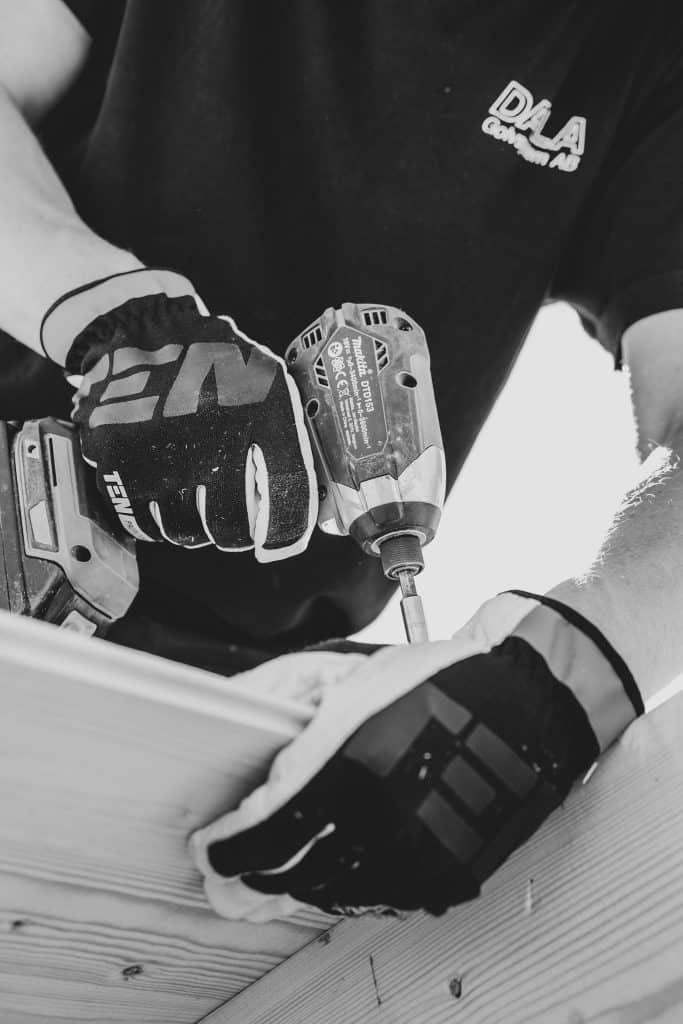If you’re working on a construction project that involves concrete, you’ll likely need to use concrete screws. These screws are specially designed to anchor items to concrete, brick, and other masonry surfaces. However, not all concrete screws are created equal. Large diameter concrete screws are ideal for specific projects that require a stronger hold.
Large diameter concrete screws are typically used for heavy-duty applications, such as attaching structural elements to concrete, such as beams, posts, and brackets. These screws are designed to provide a secure hold that can withstand heavy loads and high stress. They are also ideal for applications that require a deeper embedment depth, such as in thicker concrete walls or floors.
At Fastening Specialists, we offer a variety of large diameter concrete screws from top brands like DeWalt, Powers, and Tie Max Pro. Our experienced team can help you choose the right screw for your specific project needs. With over 65 years of experience as a trusted wholesale distributor, we have the expertise to provide you with the best product value, insight, code expertise, and order fulfillment.
Understanding Concrete Screws
Concrete screws are versatile fasteners used for anchoring fixtures and objects to concrete surfaces. They are designed to provide a secure and long-lasting hold, even in challenging conditions. In this section, we will discuss the different aspects of concrete screws, including their material and coatings, diameters and lengths, and types of concrete anchors.
Material and Coatings
Concrete screws are commonly made from materials such as zinc, stainless steel, and carbon steel. Zinc and stainless steel screws have excellent corrosion resistance, making them ideal for outdoor and marine applications. Carbon steel screws are more affordable and are suitable for indoor applications.
Additionally, concrete screws can be coated with various materials to enhance their performance. Galvanized coatings provide extra protection against corrosion, while black oxide coatings add lubricity and improve the screw’s appearance.
Diameters and Lengths
Concrete screws come in various diameters and lengths to suit different applications. The most common diameters range from 3/16″ to 3/4″, while lengths vary from 1 1/4″ to 6″. It is important to choose the right diameter and length based on the material thickness and the weight or load it needs to support.
When selecting the screw’s diameter, ensure that the drill bit size is slightly smaller than the screw itself to ensure a proper fit and secure installation. For example, for 3/16″ diameter concrete screws, use a 5/32″ or 3/16″ drill bit. For 1/4″ diameter concrete screws, use a 3/16″ or 1/4″ drill bit.
Concrete Anchor Types
There are several types of concrete anchors, including sleeve anchors, wedge anchors, and drop-in anchors. Sleeve anchors are versatile and can be used for various applications. They are easy to install and provide a secure hold. Wedge anchors are designed for heavy-duty applications and can support higher loads. Drop-in anchors are used for flush-mounting applications and provide a clean appearance.
DeWalt fasteners, Powers fasteners, and Tie Max Pro fasteners are some of the top brands that manufacture concrete screws. As a trusted wholesale distributor for over 65 years, Fastening Specialists provide the best in product value, insight, code expertise, and order fulfillment. Our experts are always ready to provide advice and best use-cases, but always check with local building codes and engineers for correct usage instructions.
The team at Fastening Specialists provides advice and best use-cases, but always check with local building codes and engineers for correct usage instructions.
Preparation for Installation
Before installing large diameter concrete screws, it is important to properly prepare the surface and have the right tools and equipment on hand. This section will cover the necessary steps for preparation, including selecting the right drill and drilling the pilot hole.
Selecting the Right Drill
To install large diameter concrete screws, you will need a hammer drill with a carbide bit. It is important to make sure that the drill bit is the correct size for the screw you will be using. If you are unsure of the correct size, consult the manufacturer’s instructions or contact a professional.
Drilling the Pilot Hole
Once you have selected the correct drill and bit, it is time to drill the pilot hole. This hole should be slightly smaller than the diameter of the screw, and should be pre-drilled to ensure accuracy. Make sure to clean out any debris from the hole before inserting the screw.
When drilling the pilot hole, it is important to keep the drill straight and steady to avoid any damage to the surface. Use a level to ensure that the hole is drilled straight.
Fastening Specialists is a trusted wholesale distributor for over 65 years, providing expert advice and best use-cases for all your fastening needs. With a wide range of products, including DeWalt fasteners, Powers fasteners, and Tie Max Pro fasteners, we are the specialists in this field. You can trust us for the best in product value, insight, code expertise, and order fulfillment.
Remember to always check with local building codes and engineers for correct usage instructions. The team at Fastening Specialists provides advice and best use-cases, but it is important to follow all local regulations and guidelines for safe installation.
Installing Large Diameter Concrete Screws
Large diameter concrete screws are ideal for heavy-duty fastening applications in concrete, brick, and block. They are designed to provide a strong, reliable hold, and can be used for a variety of projects, including attaching wood framing to concrete walls, fastening metal brackets to concrete floors, and securing outdoor structures to concrete slabs.
Embedment and Fastening
When installing large diameter concrete screws, it is important to ensure that they are embedded correctly into the concrete. The minimum embedment depth for these screws is typically 1-1/2 times the diameter of the screw. For example, if you are using a 1/2-inch diameter screw, the minimum embedment depth would be 3/4 inches.
To ensure proper embedment, it is recommended to use a hammer drill with a carbide-tipped masonry bit to drill a hole that is slightly deeper than the screw length. After drilling the hole, use a wire brush or compressed air to remove any debris from the hole. Then, insert the screw into the hole and tighten it using a hex head socket or an impact wrench.
Using an Impact Wrench
Using an impact wrench can make the installation of large diameter concrete screws faster and easier. An impact wrench applies a high amount of torque to the screw, allowing it to be tightened quickly and efficiently. When using an impact wrench, it is important to use the correct torque setting to avoid over-tightening the screw. Over-tightening can cause the screw to strip or break, which can compromise the integrity of the fastening.
At Fastening Specialists, we offer a variety of large diameter concrete screws, including DeWalt fasteners, Powers fasteners, and Tie Max Pro fasteners. Our products are designed to provide reliable, long-lasting performance, and are backed by our more than 65 years of experience as a wholesale distributor of high-quality fastenings. As specialists in this field, we can provide you with expert advice and best use-cases for all of your fastening needs.
The team at Fastening Specialists provides advice and best use-cases, but always check with local building codes and engineers for correct usage instructions.
Applications and Uses
Large diameter concrete screws are versatile fasteners that can be used for a variety of applications. They are designed to provide a quick and easy way to mount and fasten objects to concrete surfaces. Here are some of the most common applications and uses of large diameter concrete screws:
Mounting and Fastening to Concrete
Large diameter concrete screws are ideal for mounting and fastening objects to concrete surfaces. They can be used to secure brackets, shelving, and other objects to concrete walls, floors, and ceilings. These screws are easy to install and provide a secure hold that is resistant to vibration and shock. They are also corrosion-resistant, making them ideal for use in outdoor applications.
When selecting large diameter concrete screws for your project, it is important to choose the right size and length for your application. Be sure to use the appropriate drill bit size and depth to ensure a proper fit. You can trust Fastening Specialists as a trusted wholesale distributor for over 65 years to provide you with the best in product value, insight, code expertise, and order fulfillment.
Heavy-Duty Applications
Large diameter concrete screws are also suitable for heavy-duty applications. They can be used to secure heavy equipment and machinery to concrete surfaces. These screws are designed to provide a secure hold that is resistant to vibration and shock, making them ideal for use in industrial and commercial applications.
When using large diameter concrete screws for heavy-duty applications, it is important to choose the right size and length for your application. Be sure to use the appropriate drill bit size and depth to ensure a proper fit. You can trust Fastening Specialists as a trusted wholesale distributor for over 65 years to provide you with the best in product value, insight, code expertise, and order fulfillment.
Large diameter concrete screws are a versatile and reliable fastening solution for a wide range of concrete applications. Whether you are mounting brackets or securing heavy equipment, these screws are designed to provide a secure and long-lasting hold. The team at Fastening Specialists provides advice and best use-cases, but always check with local building codes and engineers for correct usage instructions.
Maintenance and Removal
Large diameter concrete screws are a durable and reliable solution for anchoring heavy loads in concrete and masonry structures. However, to ensure their optimal performance and longevity, it is important to inspect them regularly for wear and corrosion, and to follow the correct procedure for removal.
Inspecting for Wear and Corrosion
Inspecting your concrete screws for wear and corrosion is an essential part of maintenance. Over time, screws may become damaged or corroded due to exposure to moisture, chemicals, or other environmental factors. To ensure your screws remain in good condition, you should inspect them regularly and replace any that show signs of wear or corrosion.
When inspecting your screws, look for signs of rust, pitting, or cracking on the surface. If you notice any of these signs, it may be an indication that the screw is no longer safe to use and should be replaced. In addition, check the threads of the screw for any signs of damage or wear. If the threads are worn, the screw may not be able to hold the load properly and should be replaced.
Removing and Reusing Screws
If you need to remove your large diameter concrete screws, it is important to do so correctly to avoid damaging the surrounding structure. To remove the screws, you will need to use a power drill with a reverse function and a compatible driver bit.
To remove the screw, insert the driver bit into the screw head and set the drill to reverse. Slowly back out the screw, being careful not to damage the surrounding structure. Once the screw has been removed, you can reuse it if it is still in good condition.
It is important to note that not all large diameter concrete screws are removable. Some screws are designed for permanent installation and cannot be removed without damaging the surrounding structure. If you are unsure whether your screws are removable, consult the manufacturer’s instructions or contact a professional for assistance.
Fastening Specialists is a trusted wholesale distributor for over 65 years, providing high-quality fastening solutions. We offer a wide range of concrete screws, including DeWalt fasteners, Powers fasteners, and Tie Max Pro fasteners. Our expert team provides advice and best use-cases, but always check with local building codes and engineers for correct usage instructions.

